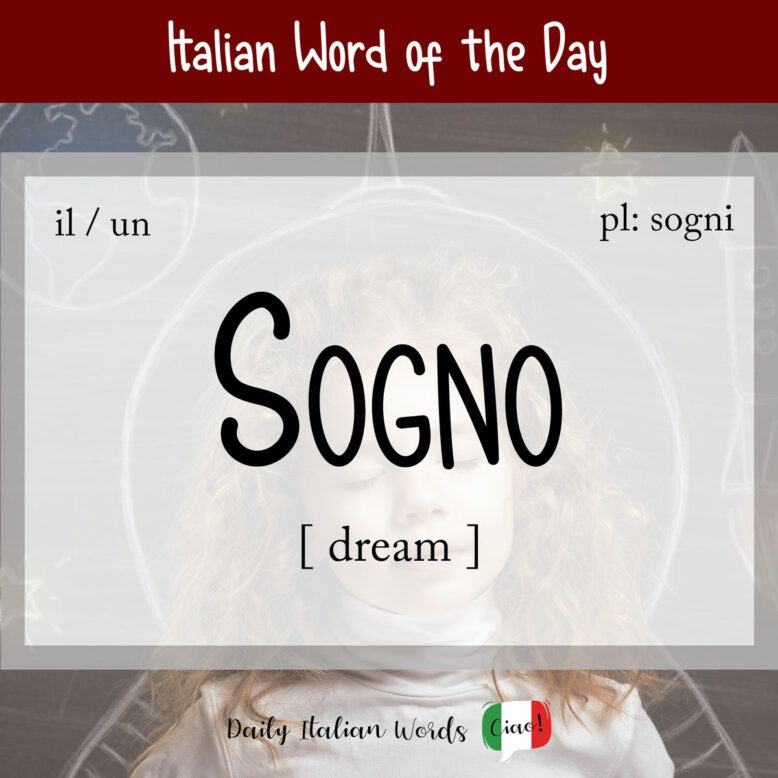Dreams, those ethereal and enigmatic realms of our imagination, have captivated human minds for centuries. In the Italian language, the word for dream is sogno, which comes from the Latin word of the same meaning, somnium.

Sogno, being a masculine noun, takes the following definite and indefinite articles:
- il sogno = the dream
- i sogni = the dreams
- un sogno = a dream
- dei sogni = (some) dreams
It is closely related to the verb sognare meaning “to dream“, in addition to sognante (dreamy) and sognatore/sognatrice (dreamer).
Another way to express the verb “to dream” in Italian is by using the combination of the verb fare (to make / do) with the noun sogno, making fare un sogno (to dream / have a dream). Fare un bel sogno means “to have a good dream” whereas fare un brutto sogno signifies the very opposite. A brutto sogno (bad dream) can also be referred to as an incubo (nightmare).
Ieri notte ho fatto un bel sogno.
I had a good dream last night.
Note: Sogno is also the first-person indicative form of sognare, so it can also mean “I dream“. For example, sogno di volare = I dream of flying.
When you want to convey the feeling that something seems like a dream, such as the unexpected opportunity to see your beloved after a long absence, you can use the expression sembrare un sogno. This phrase captures the notion of the experience being almost too good to be true, as if it were a dream come to life.

In a figurative sense, the Italian word sogno can also refer to something desirable that is unrealistic or unlikely to happen, which can also be said for English word dream. In this sense, it can also be translated as aspiration, pipe dream or desire.
Il mio sogno è di vivere in Italia un giorno.
My dream is to live in Italy one day.
A life-long (yet unrealised) dream can be called un sogno nel cassetto (literally “a dream in the drawer”) in Italian, whereas a dream come true can be translated as un sogno diventato realtà.
Here are a few common verbs that you will see used with sogno in both its literal and figurative senses:
- realizzare un sogno = to realise a dream
- apparire in sogno = to appear in a dream
- credere ai sogni = to believe in dreams
- interpretare un sogno = to interpret a dream
- vedere qualcuno/qualcosa in sogno = to see someone/something in a dream

When sogno is preceded by the preposition da, it functions as an adjective that means dreamlike or marvellous, as in una vacanza da sogno (a dream vacation) and una casa da sogno (a dream house).
In the same sense, you might also hear the expressions un sogno di (qualcosa), as in un sogno di ragazza (a dream girl) or un sogno di macchina (a dream car), or (qualcosa) è un sogno, as in questo letto è un sogno (this bed is a dream).
Another expression Italian shares with English is dei miei sogni (of my dreams).
Lei è la ragazza dei miei sogni.
She is the girl of my dreams.

A very common idiomatic expression in Italian is Neanche per sogno! (or Nemmeno per sogno!), both of which are the equivalent of “In your dreams!” or “Not a chance!” in English.
Vieni con me alla festa? – Neanche per sogno!
Are you coming with me to the party? – Not a chance!
Sogno, o son desto? is the title of an duet from Giuseppe Verdi’s five-act opera I Vespri Siciliani (The Sicilian Vespers). It translates as “Am I dreaming, or am I awake?“
Heather Broster is a graduate with honours in linguistics from the University of Western Ontario. She is an aspiring polyglot, proficient in English and Italian, as well as Japanese, Welsh, and French to varying degrees of fluency. Originally from Toronto, Heather has resided in various countries, notably Italy for a period of six years. Her primary focus lies in the fields of language acquisition, education, and bilingual instruction.


